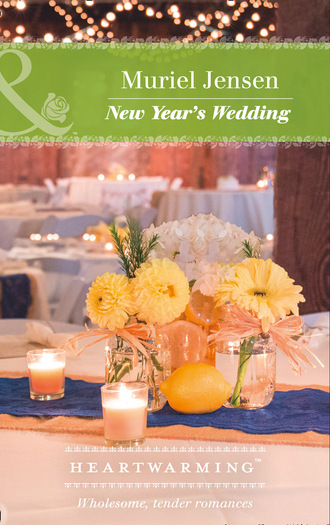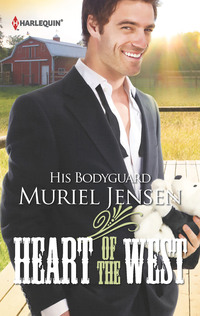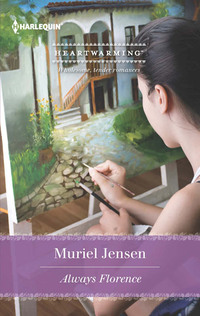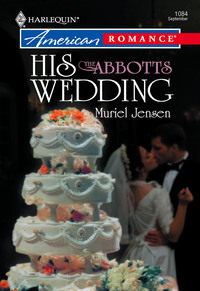
Полная версия
New Year's Wedding
They stepped up onto the fir-wood floor of the bedroom. “She thinks you’re toying with me for selfish purposes. I kind of like the notion, so I didn’t try too hard to set her straight.”
“Grady.”
“Okay, I did try. You’re right, though. She is a hardheaded woman, but that’s helped her a lot in her life. And she’s a great person, when she’s not acting like a mother bear.”
“You’re lucky to have someone care that much about you.” She turned her attention to the room. It was a big space with lodge-style furnishings that looked like they hadn’t been disturbed since they’d been placed. “It’s beautiful up here. Thank you. I’ll try not to get too comfortable.”
He went to the small bath in the corner and reached in to flip on the light. “You might want to get comfortable. I’ve been thinking about Jack’s and Corie’s situations and, much as I’m sure either one would love to have you, Jack and Sarah are in the process of packing to move to a house nearer the assisted-living facility, and Ben’s got a great condo, but it has only two bedrooms, and he’s bringing home two kids—a boy and a girl. So you’d probably end up on the sofa.”
* * *
THAT WAS TRUE. She’d had no choice in Querida but to escape the press or let them intrude upon her reunion with her family. But she made a mental note to remember that even in moments of great distress, she had to plan ahead a little. Every step she’d taken so far would have been off a cliff if it hadn’t been for Grady.
She had to smile. “Your mother would hate that.”
“True, but she’d adjust. Look around, figure out if there’s anything you need that isn’t here, and I’ll go get your bag.”
“Thank you. Grady?” She felt she had to say something about the meltdown. He had to be wondering. “The scene I made that ended up on television and probably all over the internet...”
“Is nobody’s business but yours.”
“I’m not like that—temperamental and hysterical and...”
He grinned. “I don’t know. Yellow M&M’s, only dark, handsome men...”
She gave him credit for the continued calm that so defined him, and that he could joke despite what his mother had revealed about her. “I just didn’t want you to think you ran off with a lunatic.”
“Nothing to worry about. I took off with you because I wanted to. That part’s on me. I’ll get your bag.”
As she heard his footsteps going down the stairs, she tried to shed her worries and focus on the quiet comfort his home offered.
The large room was decidedly masculine. A king-size bed with big pillows and a brown suede bedspread and a simple iron headboard stood against the wall. Rustic wooden bedside tables held brass lamps that looked like lanterns. She went to the triple mirror on the wardrobe door. Inside the closet were four levels of shelving about four feet wide. The other ten feet of closet had nothing in it but a hanging rod with three empty hangers.
She closed the doors then went into the smallish bathroom. It was white with a pedestal sink and a tall cabinet made of planks. It held several white and brown towels, paper products and other supplies.
A walk-in shower with a sliding door looked serviceable. On the wall next to it, clear of furniture, was a two-dimensional, three-foot-wide carving of a pirate ship, sails billowing, Jolly Roger flying. She laughed lightly at that, thinking it seemed out of character with the rest of the house and what she knew of the man who owned it.
“Ben gave that to me.”
She turned at the sound of Grady’s voice.
He stood in the doorway. “On my last birthday. He thought my life needed more adventure.”
If they were in New York, she thought, finding herself completely distracted by him, she could get him modeling jobs. He was the perfect height, had a nice face with interesting planes and angles, and an easy look in his eyes. She could picture the camera’s tight shot of his face. For a Drakkar Noir ad, or one that featured a pair of Ray-Bans slipped down his nose.
She drew herself back to the moment. This wasn’t New York. This was Beggar’s Bay, Oregon, and she had to stop thinking about work.
He stepped aside to let her pass. “Doesn’t the life of a police officer provide you with enough adventure?”
“It has its moments, but as Jack is always teasing Ben and me, mostly it’s about animal control and fairgrounds parking.”
As she went to the bed where he’d placed her bag, she noticed for the first time the waist-high carved railing that ran across the room, affording her a view of the great room below with its vaulted ceiling and the magnificent windows that looked onto the dark night.
She looked over the railing. “I had my back to this when we came up the stairs and I didn’t even notice it.”
He showed her that the fold-out shutters expanded from either side of the railing and met in the middle. “You can close these for privacy.”
“Great.”
“Is there anything you need?”
“I don’t think so. But, if I do, I can probably pick it up tomorrow.”
“All right. I can take you wherever you need to go. I’m off two more days, then Ben and I are giving two weeks’ notice.”
“Jack told me. You and Ben are going into business together. Private investigation, isn’t it?”
“Right.”
“That ought to give you more adventure than you need.”
“It should.” He backed toward the door. “Sleep well. Just shout over the railing if you need anything.”
“Okay. Thanks, Grady. I’m not sure what I’d have done if you hadn’t come with me. Somehow all the little details of running off escaped me.”
“Happy to help. See you in the morning.”
“Good night.”
Finding her toiletries bag, she took a quick shower, slipped on a midnight blue, silk nightgown, a gift from a lingerie designer after a shoot that had earned her a very large order from Neiman Marcus, left the bedside light on, and climbed into bed.
Snuggling into a soft pillow, Cassie thought about what she would need in the way of clothing to survive the next week in this rainy world. But she fell asleep before a plan could take shape.
CHAPTER THREE
GRADY SMELLED COFFEE and something sweet. He wondered what was cooking. And who.
He sat up in bed, expecting to see the simple beige wall from the B and B in Querida with its poor print of cowboys around a campfire. Instead he saw the lush conifers outside his window in Beggar’s Bay, a pewter-gray sky and local geese flying at a low altitude in a ragged vee toward the bay.
He was home. He felt a weird sense of loss at the realization. Not that he didn’t love his home, but he’d had a really great time in Querida. He’d spent a couple of weeks there, helping Ben put up a play set for the kids, getting to know Corie, Jack’s sister, and helping Ben solve a few mysteries Corie was involved in.
When Ben and Jack’s parents arrived in Querida to spend Christmas, it truly became family time. Then he had answered a knock on the door when everyone else was busy, and a supermodel had begun to introduce herself—then fainted dead away in his arms. Two days later she’d pleaded with him to run away with her. He had a rental vehicle and she didn’t, and her need to get away had seemed desperate.
A supermodel. Cassidy Chapman was asleep upstairs in his loft. Or, based on that wonderful smell, maybe she wasn’t. He got to his feet, pulled on his jeans, yanked a Seahawks sweatshirt out of a pile of things still on the chair from his unpacking and went barefoot down the hall to the kitchen.
He needed a moment to pull himself together. Cassie was working at the stove in a dark blue silky thing that skimmed her bare feet. Over it, she had pulled the sweater he’d lent her last night to get from the car to the house. She held a spatula, but her head was turned toward a television at the end of the counter.
He finally opened his mouth to shout a good morning over the sound of the TV and then closed it again when he realized she was watching the infamous video of her meltdown. It had apparently made the morning news.
On the screen was a sharp image of everyone involved in the shoot gathered on the grounds of a palatial country home with a pillared portico. They all pressed around Cassie, who stood in the middle in a fluttering red dress. Someone adjusted her hair while someone else seemed to be fitting something over her eyes as yet another person leaned in to make an adjustment to the neckline of the dress.
Without warning, a scream was heard, the tableau erupted, the circle around Cassie freezing in place—except for that dedicated makeup artist with her hands at Cassie’s eyes. Cassie screamed again and grabbed the young woman by both wrists.
The woman’s arms hung in Cassie’s grip with what looked like a spider in one hand and a tiny bottle in the other, her mouth an O of astonishment.
“Stop!” Cassie’s voice was high and shrill. “I asked you to stop! Are you deaf?”
For an instant both women stared at each other, then Cassie dropped the woman’s wrists, picked up the long skirts of her dress and ran.
The video over, a female reporter appeared on-screen accompanied by a cohost and a beautiful dark-haired woman Grady thought looked vaguely familiar. They sat at a table in the studio.
“I’m sure you all recognize Fabiana Capri,” the reporter said, “the spokeswoman for the new Tesla smart car, and Cassidy Chapman’s good friend. What do you make of that behavior, Fabiana?”
The model, dressed in yellow, shrugged an elegant shoulder. “I’m not sure what happened,” she replied with a look of concern. “Cassie disappeared right after that and no one’s seen her or talked to her since. It could be that it had been a very long day for her. She works very hard, gives every job her all, in sometimes very uncomfortable circumstances. When we did the Sports Illustrated shoot, the temperature was 57 degrees and the water was freezing. I got to pose on a rock, but Cassie stood in cold water up to her knees for an hour before the photographer felt he’d gotten it right.”
“Stars at Night,” the reporter said, “thought she might have been upset because she’d wanted the SI cover and you got it.”
The model laughed. “I doubt that seriously. Last year she had the cover and I didn’t. But we’re all adults. We’re in competition for the big jobs, but you win some and you lose some. It’s the same in every business, even fashion.” She leaned forward, expression earnest. “What you should be talking about is the trust Cassie set up for poor women needing clothes and transportation so they can look for work.”
The reporter ignored that. “But you’ve never imploded during a shoot.”
“Sure, I have. I was just lucky enough that none of the crew sold me out to the press.”
“Maybe when you grab the young woman doing your makeup and yell at her for not hearing you when she really is deaf, your adoring fans should know that about you.”
Fabiana waited a beat, obviously straining for patience, then said, “In Cassie’s defense, the woman was a last-minute replacement because it was the holidays and the makeup artist who knows about...who Cassie’s used to working with, had already left to be with family in Alaska. Cassie didn’t know the woman was deaf. How many times have we all said that when people don’t respond to us the way we think they should?”
Again the reporter let that go. “You said Cassie disappeared. Do you have any idea where she went?”
Fabiana knew something; Grady could see it in her eyes. “I don’t, but I’m sure she’ll turn up in February to do the fund-raiser for Designers United Against Hunger.”
Apparently a reporter’s instinct was as strong as a cop’s. “You hesitated there. You do have a clue where she is.”
Fabiana smiled and shook her head. It was the smile she used in the Tesla commercial, capable of selling anything to anyone. “No. It’s Cassie’s life. She’ll come back to it when she’s ready.”
The reporter thanked her and announced a station break. Cassie aimed the remote at the television and clicked it off. She groaned as she turned back to the stove.
“Good morning,” Grady said. “I wouldn’t worry about that too much. Tomorrow some politician will say something stupid and they’ll forget all about you.”
“Hi, Grady.” She glanced at him with a half smile and flipped a pancake. “I couldn’t find an apron to protect your sweater. Do you have anything?”
Worried about her bare feet on the cold floor, he went to the thermostat first and turned up the gas heat. Then he opened the bottom drawer in the stove that held a barbecue apron his mother had given him that he’d never used. He handed it to her. She slipped her head through the neck hole and tied the strings behind her. Born to Barbecue was printed in rough red lettering above a caricature of a man in front of a barbecue, his chef’s hat on fire.
She looked down at herself and snickered. “Now here’s a look for the catwalk. Sit down. I’ll get you some coffee.”
Two places were set at the breakfast bar. She’d found two placemats he never used along with dark blue cloth napkins stored in the same drawer.
She poured coffee and brought him a cup. “This might be a little girlie for you. It’s Colombian coffee with dulce de leche flavor. I have a pound in my bag whenever I travel.”
He took a sip. “Definitely girlie, but good.” It was wonderful to have coffee ready when he got up. Even girlie coffee. Since she clearly didn’t want to talk about the news, he observed, “You’re making pancakes?”
“Crepes,” she corrected. “Fewer calories. I found frozen blueberries in the freezer, cooked them down with sugar and made a compote for topping. Is that all right?”
He leaned his forearms on the bar and looked into her bright eyes. Her hair was pulled into a high ponytail. She looked remarkably fresh, if sad.
“No,” he replied with a straight face. “I want the same old, dry fruity flakes and past-the-pull-date milk I always have in the morning.”
“No!” She pulled a plate out of the oven. “Tell me you don’t really eat fruity flakes.”
“I would, but it would be a lie. I’m sure they have nothing of nutritional value in them, but then, the bad guys don’t really care how trim I am, and I have a maple bar midmorning to keep up my strength.”
If she thought that was a bad idea, she kept it to herself and brought him a plate of crepes and a steaming pitcher of compote. Butter was already on the bar. The aroma made him salivate.
“You can cook, too,” he said in wonder, pouring blueberries on the crepes and passing the pitcher to her as she sat beside him with her own plate.
“I grew up without a mother,” she said. “My father was gone a lot and nannies aren’t always good cooks. I loved my cooking class in high school, and I watch food shows. It’s amazing what you can pick up.”
“Are models allowed to eat this stuff?”
“There are antioxidants in the blueberries.” She elbowed him. “I’m on a break. After the wedding, I’ll go back to fasting.”
“Sorry. You hear stories, you know, about how you guys eat only lettuce and lemon juice and work out six hours a day.”
“Exaggerated.”
“We’ll go to the market and get whatever kind of food you want.”
“Actually, I have to go clothes shopping. Doesn’t have to be fancy, but I have nothing for underwater living.” She pointed to the kitchen window beaded with rain, the trees beyond it swaying in the wind.
He turned to her. “Winter in Oregon. Some people adjust to the wet and some people don’t.” He cut a bite of crepe with the side of his fork. “It’ll probably be harder for you...”
She frowned at him over the rim of her cup. “Why? Because you think I’m used to bigger and better things, and take pleasure in abusing all the ‘little people’ in my life? That isn’t true.”
“That’s not what I—”
“I’m the first to admit I live a very good life, but no one escapes problems.”
“That’s for sure.”
“You’re wondering what kind of problems a model could possibly have.”
Now she was acting a little like a diva. Or maybe she was just upset by her appearance on the news. Who wouldn’t be in her position?
He smiled. “Well, all that mind reading you’re doing has to be a problem, for one thing. Can you read everybody’s or just mine?”
Her eyes ignited. “You’re laughing at me.”
“Just a little. Anyone who presumes to know what someone else is thinking is fair game.”
Sipping at her coffee, she met his eyes, but the easy camaraderie they’d shared since they’d escaped Querida together wavered.
“I’m sure one of the problems,” he said, trying to defuse her anger, “is that everything in your life, however private or personal, can be recorded, replayed and streamed for all the world to see. That’s pretty awful.”
She relaxed a little, heaving a sigh before she said, “It doesn’t matter that the interpretation of what happened is incorrect, entertainment and internet reporters put the most salacious or embarrassing spin on their news. I’ve avoided much of it, but they seem happy to have a juicy tidbit now.” She shook her head at him.
“Were you upset about the Sports Illustrated cover? I mean, there has to be more prestige in being on the cover than just inside it, right?”
“My behavior had nothing to do with the Sports Illustrated cover!” she shouted at him. She stopped a moment, drew a breath and went on in a measured tone. “I’m sorry. I...I don’t know if you know that just before I went to Ireland, my father was stuck in Bangkok during a coup and we had no idea if he was all right or not. The pictures on the news were scary. He’d gone there to work on the computers for the government. On special jobs, he always goes himself. That’s what built his reputation as one of the best IT men in Europe. I was terrified.”
“Yes. That had to be awful for both of you.”
“Well, I’d just learned the day before that he was all right. And the following day he called to tell me that my siblings, who I’ve been separated from most of my lifetime, were in Texas and wanted me to join them.”
“Yes.”
“I had to finish the shoot before I left, but the makeup artist was making me crazy.” She tipped her head from side to side self-deprecatingly. “Clearly, I wasn’t looking my best, the wind was blowing my hair, and she was determined to make these false eyelashes fit and stuck her finger in my eye. She wouldn’t stop.”
He looked empathetic.
She put a hand out in front of herself about three feet away. “Here in the US, the three feet surrounding you are considered your personal space. You feel challenged and a little touchy when people invade it.”
Unsure where she was going with this, he nodded to assure her of his attention.
She continued. “Okay. So, try to think of yourself as a model. Hair and makeup people are always right in your face—” she fluttered her fingers an inch from her cheeks “—touching you, pushing you here and there so they can work on you. I know it isn’t their fault because you’re sort of their canvas. So you’re like a thing, not a person, to them in that moment. Designers fitting you into their clothes don’t even see you as a person, you’re just a place to hang their clothes and they’re always turning you, pushing you, ignoring you and seeing only the clothes. I’ve been modeling since I was sixteen, so most days I accept it’s just part of the process.
“But, when I’m tired, worried, frightened, they’re like some buggy invasion and I feel like I’m going to go insane...” She sighed and pushed her plate away. “Or say something awful. Like, ‘Are you deaf?’” She put her head in her hands and groaned. “Of course, I didn’t really know she was deaf. I ran away so I wouldn’t go over the edge before I got to meet my family.”
She dropped her hands and looked at him with a wince. “It’s all part of a bigger problem I’ve had most of my life, and modeling just exaggerates it.” Without clarifying, she continued. “I did go back and apologize to everyone involved, particularly the makeup artist. I wrote a note to her and then tried to explain face-to-face. She seemed to understand. I bought the crew’s dinner that night before I took off for Texas. It would be nice if SAN would report that.”
“You have the comfort of knowing you have a good friend in Fabiana. She did her best to make that reporter understand.”
She nodded. “I do. She’s as wonderful a person as she is beautiful.” She slipped off the stool. “I’m going to get dressed.”
“I’ve got a raincoat you can borrow.”
“Thank you.” She started away then turned back to add, “I’ll take care of the dishes when we get back.”
He pointed to the dishwasher. “It’s all under control.”
* * *
WHEN CASSIE AND Grady met at the front door twenty minutes later, she wore a pair of dark blue pants with a gray cardigan pulled over a cotton shirt. It was wrapped tightly around her. She wore boots and carried a small folded umbrella.
He tried not to laugh. “Mostly, we don’t use umbrellas around here because the wind’s usually blowing and you end up with a mouthful of metal ribs.” He held out his serviceable green, hip-length, hooded jacket.
She looked at it doubtfully but allowed him to help her into it. He pulled up the hood. With a jolt, he noticed how gorgeous she was even lost in the dung-colored fabric.
Her height provided him with a different perspective on the feminine face. At six-two, he was used to looking down on the top of a woman’s head, on the curve of her eyelashes, the shape of her nose. With Cassidy close to six feet tall, he looked into fathomless eyes that looked right back into his and somehow seemed to see more deeply than he was comfortable with. He watched the subtle movement of her beautifully shaped lips, covered in pale and glossy pink. Those lips now inverted in a frown.
She gasped her disapproval and pinched the leather on the arm of the ancient bomber jacket he wore. “Let’s swap,” she said, the tension between them from breakfast seemingly put aside. “I can wear your jacket, and you can wear this.”
“Not a chance, Blondie,” he replied with a grin. “This jacket has been with me through college, nature hikes, pickup football...”
She held out her arms. “And this has been with you through putting out the garbage and covering tomato plants against the cold. It has absolutely no style.”
“Do you want to be warm and dry, or do you want style?”
“Life should allow you both.”
He turned her around and opened the door. “I’m sorry, but today it doesn’t. Let’s go.”
* * *
GRADY WAS AMUSED, even charmed, by watching Cassie shop. The Beggar’s Bay Boutique had to be far less interesting than the places she usually patronized, but she really seemed to be enjoying herself.
The clerk, a twentysomething whose badge read Molly, ran to the dressing room to take garments Cassie handed out and then brought her more pants, dresses, sweaters. She scoured the racks with avid intensity while Cassie shouted suggestions from behind the curtain. “The jeans are still too short!” Cassie called.
“That’s the longest I’ve got in women’s! What about the smallest, longest pair from the men’s department?”
There was a moment’s hesitation then, “Sure.”
Cassie emerged twenty minutes later with dark jeans from the men’s department that were sparely designed but seemed to fit well. She’d pulled a bright yellow sweater over them and dropped everything else on the counter. She stood still while the clerk cut tags off her outfit.
“Why didn’t you buy a jacket?” Grady asked. “Or slippers?”
“The jackets are all too short for me. So, it’s back to the tomato plant cover. And my feet are too big for the size range here.” She pulled on the green raincoat, looking bright and happy. That made him feel better. She grinned. “Good thing I brought my boots along.”
“You going to wear those to the wedding?”
“No, I’m going to have something sent to me One-Day Air.”
Of course. Whatever her problems were, getting whatever she needed wasn’t one of them.
The clerk took Cassie’s card and swiped it. Then as she studied the card, her fingers began to tremble. She looked up at Cassie in astonishment. “I thought it was you,” she breathed.












